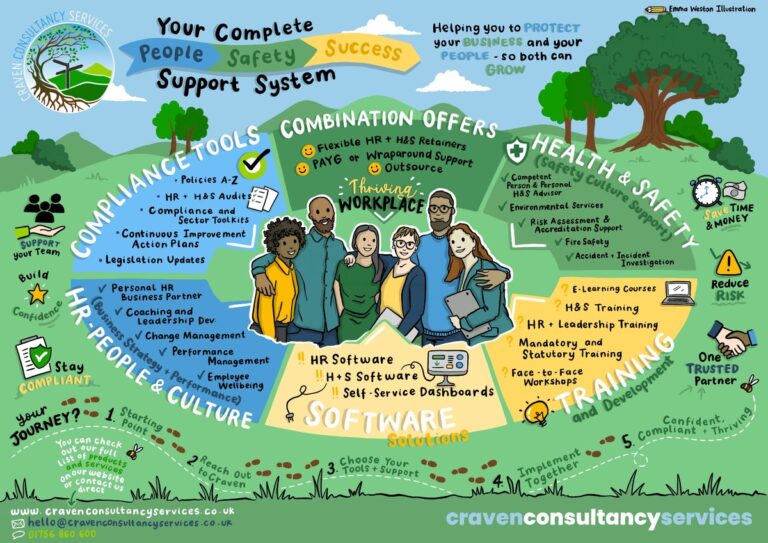I recently experienced the sudden loss of my incredible mum

Navigating this grief while managing work has been one of the toughest challenges I’ve faced. During this difficult time, Liz, our MD, along with Megan and Tonie, demonstrated outstanding compassion and understanding that greatly helped me balance both personal and professional responsibilities.
From our first conversation about my mum’s passing, Liz offered bereavement leave without hesitation, encouraging me to take all the time I needed to grieve without any pressure to return until I felt ready. This flexibility allowed me to focus on my family and myself.
The team even sent thoughtful Lush products as a comforting gesture; it truly means so much.
We are fortunate to have such an empathetic workplace culture

Inclusive Employers can request our factsheet about supporting colleagues through grief, we can also provide the relevant Policies to support your business and people including Our Workplace Wellbeing Strategy Toolkit.
Dee x
Dee Newton
Operations Manager & HR Business Partner

Breaking down the workplace taboo; Supporting Bereaved Employees & Creating a Compassionate Culture
Experiencing loss, grief and bereavement is a common problem that may significantly impact individuals at some point, at work. Consequently, while they go through this difficult time it could have a real impact on their performance and the business at large. Statistics reveal that 56% of employees would consider leaving their jobs if their employer failed to provide proper support if someone close to them died. In this article, we explore ways to support employees through grief and loss, emphasising the significance of acknowledging the emotional challenges and fostering a compassionate workplace culture.
Despite the large number of people who are grieving, most of us still find it difficult to support those who are struggling. It’s one of those delicate, taboo, and difficult topics, and many of us believe we lack the courage and abilities to provide ‘the correct’ support.
Grief is one of the most difficult experiences a person can have, so it’s critical to provide support to co-workers at all levels. Every employee’s mental health and well-being is critical, and businesses must help them deal with issues.
The implications of failing to properly support employees during grief can be disastrous for your company. You risk not only losing some of your best employees, but also jeopardising your company culture and making someone’s bereavement process much more difficult.
What is bereavement?
Bereavement is the experience of losing someone important to us. It’s characterised by grief, which is the process and the range of emotions we go through when we experience a loss.
Losing someone important to us can be emotionally devastating – whether it’s a partner, family member or friend. Grief can bring up lots of different, complicated emotions, and can sometimes affect our physical health. Mind’s page on experiences of grief describes some common feelings.
Understanding Grief
Grief is a complex set of emotions that individuals may experience after the death of a close person. However, these emotions are rarely openly discussed in the workplace, where employee engagement and wellness are often overlooked in the context of grief.
Challenges of Grieving at Work
Returning to work after a loss poses a considerable challenge for grieving employees. It is not only a personal struggle to regain a sense of normalcy but also a challenge for colleagues and managers to provide appropriate support. Many organisations fail to recognise the impact of grief on employee engagement and overall wellbeing.
What is a compassionate culture?
A compassionate culture is one that encourages everyone who works for you to feel they can talk about things like illness, bereavement and grief.
Compassionate leadership is at the heart of it. It’s about empowering managers to use common sense and empathy to understand the issues that may be affecting their employees’ lives – and encouraging senior management to share their experiences also.
Why a compassionate culture is important
A compassionate culture can help people to feel supported at work. It can help with staff wellbeing and people’s engagement with their colleagues and work. For many employers, the coronavirus pandemic has brought home how important it is to have a compassionate workplace culture.
How you create a compassionate culture will depend on what works for your organisation and your employees. Here are some things you can do to create a compassionate culture and support people who have been bereaved:
- Create a bereavement policy for both line managers and their staff to understand what support is available.
- Consider whether you can pay bereavement leave even when there is no statutory requirement to offer it.
- Know and respect your employees’ cultural diversity. Understand their different cultural and religious beliefs and allow them to take a lead in suggesting how they want to be supported.
- Integrate death, bereavement, and grief into your organisation’s wellbeing plans – offer a range of support for employees and line managers.
- Think about where you can share with staff that this matters to the organisation. For example, on your intranet site, in job ads, and in inductions for new staff.
- Offer training for line managers on understanding grief, your policy and what to say when someone experiences a bereavement, or when a bereavement is anticipated.
- Consider setting up a bereavement champion network, and introducing bereavement champion, and buddies.
- Encourage people to understand and talk about bereavement. Work with staff who’ve been bereaved, who know what it’s like and can help you craft solutions that will be most helpful.
- Take part in events that have particular meaning or relevance for your organisation. For example, Marie Curie’s Day of Reflection and the Good Grief Festival .
Marie Curie Key Research Findings
https://www.mariecurie.org.uk/help/support/bereaved-family-friends/work/employer-resources/research-data-bereavement-work
All facts and figures are from Marie Curie’s research findings unless referenced separately.
How bereavement affects employees
- Around 1 in 8 people in the UK have experienced a bereavement since the start of the coronavirus pandemic.
- Most employees (58%) felt their performance at work was affected by their grief months after the death of a loved one.
Support at work for bereaved employees
- More than half (56%) of employees would consider leaving their employer if treated badly following a bereavement (NCPC Dying Matters (2015) Life after death bereavement report).
- Many employees who had been bereaved (43%) felt pressurised to return to work before they were ready.
- 1 in 3 line managers (31%) would welcome help on how to support bereaved employees.
Bereavement policy and practice
- Many employers underestimate how many people are affected by bereavement.
- Only 1 in 3 employers had a bereavement policy and often this didn’t reflect what happened in practice.
- There is significant scope to improve practice among many employers, including having an up-to-date bereavement policy, guidance for line managers and a range of support for employees.
Find out how they’d prefer you to respond
Some people might not want to talk about their bereavement much at all, and instead find some escape from their feelings in work. Or they may just want it to be acknowledged, and then choose whether they want to bring it up again.
They might like the reassurance that they can take time out if they’re feeling emotional. If you’re going to be working together, you could ask them, or their line manager, what they’d prefer from you.
Bereavement Leave Consideration
Offering bereavement leave to employees in a small/medium sized business, and whether it should be paid, is an important consideration that balances compassion, employee well-being, and business operations. Here are some points to consider:
- Legal Requirements
- Jurisdiction: Depending on where your business operates, there may be legal requirements for providing bereavement leave. In some places, this leave is mandated and must be paid, while in others, it may be unpaid or not required at all.
- Employee Morale and Well-being
- Compassionate Workplace: Offering paid bereavement leave shows that the business values and supports its employees during difficult times. This can foster loyalty, improve morale, and create a positive work environment.
- Mental Health: Grieving employees may not be able to perform at their best. Paid leave gives them time to process their loss without financial stress, which can lead to better long-term productivity.
- Business Considerations
- Cost: For a small business, the financial impact of paid leave can be significant, especially if multiple employees need time off at once. However, the cost should be weighed against the benefits of retaining experienced and motivated staff.
- Operations: Small businesses often have fewer employees, so even one person’s absence can disrupt operations. Planning for coverage during bereavement leave is crucial.
- Company Culture and Retention
- Attracting Talent: Competitive benefits, including paid bereavement leave, can make your business more attractive to potential hires.
- Retention: Employees are more likely to stay with a company that treats them well in difficult times. Offering paid leave can reduce turnover.
- Flexibility
- Policy Customisation: You might offer different types of leave based on the situation (e.g., the relationship to the deceased). Some companies offer a set number of paid days and allow for additional unpaid days if needed.
Conclusion
While not always legally required, offering paid bereavement leave in a small/medium business can be a valuable investment in your employees’ well-being and loyalty. It reflects a compassionate workplace culture, which can ultimately benefit both your employees and your business in the long run.
What else can you do to help support a grieved member of your team?
Ask them for lunch, or include them in other ways
If you’re planning get together with your colleagues, whether that’s checking in on a Friday afternoon, or a quiz on Teams, then you can invite them so that they still feel included in the social side of work.
They may not feel like being in a social situation, but the offer might be appreciated nonetheless.
Little gestures can mean a lot
When someone returns to work after a bereavement, they might feel quite isolated from their colleagues. They could feel like they don’t want to bring people down, or that people will feel awkward working with them.
Sending them a care package – or getting together with your team to send something – could help then feel like people are thinking of them and are there to support them if they need it.
If you’re back in the office, you could ask if they want a tea or coffee. You could even leave one on their desk with a biscuit, which may seem like a very small action, but it might help them feel like you care about how they’re feeling, and that they’re being acknowledged rather than avoided.
Pick your moments with care
Offering condolences in the workplace can feel so awkward, both for you and the person whose been bereaved.
As it’s very personal, it’s best to speak to them about it one on one, instead of during bigger meetings or calls. You don’t necessarily have to talk to them about it, if the opportunity doesn’t arise. Sending them an email can still show them your thinking of them.
Here are some things you should avoid saying along with a brief explanation of why
- “They are in a better place.” – This isn’t helpful to the bereaved person because the best place for their loved one is with them.
- “Be strong.” – It is not necessary for the person who is grieving to be strong. They’re dealing with a traumatic life experience and dealing with loss on a larger scale. Avoid telling people how to cope with grief.
- “There is a reason for everything.” – It’s difficult enough to come to terms with losing someone, and often there is no reason for it. It’s crucial not to invalidate the person’s feelings by dismissing the situation.
- “You can have another child still.”– It is inappropriate and impolite to tell mourning parents that they can have another child. They had a child, and now they must deal with the reality that the child passed away. Do not forget their child and invalidate the life they should have had — speak the child’s name and acknowledge their existence.
Grieving is a process
As previously mentioned, grief and bereavement can be unpredictable and can be retriggered by seemingly small events over an extended period. Talking about death at work needs to become more common, especially because so many of us are struggling with the loss of a loved one.
It is unrealistic to expect things to ‘get better’ and reduce in a linear way. We need to be comfortable and relaxed when helping someone with grief, including providing some extra flexibility at certain times.
It is natural for an individual’s approach to work to appear inconsistent after a loss, and they may lack focus or motivation. This should not be taken to indicate a permanent decline in their performance.
Closing thoughts
According to studies, while a person is working through their grief, they are more likely to come to new realisations about how they want to live and their values and priorities are more likely to shift.
When colleagues start to show signs of hope and resolve, managers can encourage and show interest in their new attitudes to life and work and listen and support them as they evolve a new way of living.
Struggling with grief must be normalised, and we all need to move forward in discussing sensitive matters in the workplace issues.
Workplace Wellbeing (including lots of Supportive Line Manager Guides)
Workplace Wellbeing ‘Stress Risk Assessment’ Strategy & Toolkit
Inclusive Employers can request our factsheet about supporting colleagues through grief, we can also provide the relevant Policies to support your business and people including Our Workplace Wellbeing Strategy Toolkit.














